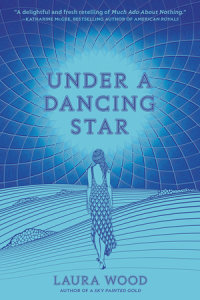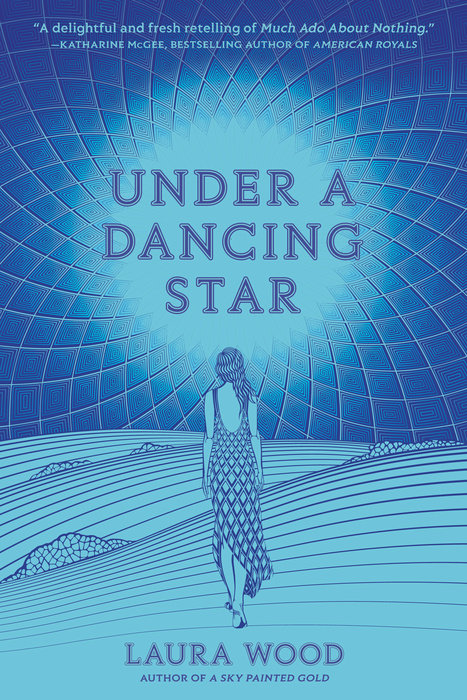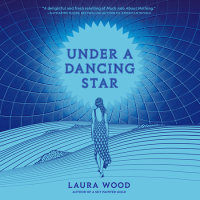Under a Dancing Star
Steal away to Italy for a hot summer, a sexy dare, and a romance that was never supposed to happen. For fans of The Gentleman's Guide to Vice and Virtue and Love and Gelato -- this is the escapist read you've been looking for!
Bea is an outspoken English girl determined to break with family tradition and pave her own path. After embarrassing her parents at a dinner party designed to find her a husband, Bea is invited to spend an eye-opening summer in Italy with her uncle's artistic bohemian friends. There, she meets Ben, a brilliant artist -- and a brilliant flirt. When sparks fly between them, a challenge is set: can they create the perfect summer romance? There's just one rule: they absolutely, positively cannot fall in love.
"Richly drawn and painfully relevant. A delightful and fresh retelling of Much Ado About Nothing." ---Katharine McGee, NYT bestselling author of American Royals
An Excerpt fromUnder a Dancing Star
Chapter One
“That’s it,” I murmur as I creep closer. “Nearly got you. . . .”
My hands are steady, and I hold my breath, waiting for precisely the right moment to pounce. With a twist of my wrist I manage to trap my elusive prey, and I screw the lid on the jar with a flourish.
Victory surges through me. I close my eyes and lift my face to the sun, enjoying the warmth as it ripples across my skin. Nearby, a garden warbler is singing, the melody dancing through the air as the bird marks his territory.
For a moment all is right with the world.
“Beatrice! Not again!” A dismayed voice drags me from my thoughts, and I open my eyes to see a figure stalking furiously down the path toward me.
“Hello, Mother!” I exclaim. “Sorry, I was miles away.” I see her jaw tighten. “What are you doing out here? Shouldn’t you be getting ready for the party?” Mother has been talking about nothing but tonight’s dinner party for months.
“I am ready for the party,” she replies frostily, and now that she is closer, I can see that this is true. My mother always looks very elegant, but she is more dressed up than usual thanks to the rope of pearls around her neck and the dusty-pink evening gown that--though it has seen better days--still retains an air of faded glamour.
My mother is a delicate woman--willowy and elegant and rather tired, like the sort of hothouse flower that droops easily. She is lovely-looking now, but I’ve seen the pictures and I know that she was very, very beautiful when she was my age. She still carries that beauty around in her bones in a way that makes people turn in the street to look at her. She can occasionally be found flicking through the pages of old fashion magazines with a mournful sigh, gazing longingly at the images of immaculately turned out debutantes.
“Oh yes,” I say, with what I hope is a pacifying smile. “You look very nice.” Mother’s disapproving glare somehow snaps straight to the jam jar, which is concealed by my dress and would be completely invisible to any other person but her.
“And is there any sensible reason,” she asks, her voice dangerously calm, “why you are standing barefoot and covered in filth in the middle of our lake?”
To be fair, it’s really more of a large pond than a lake, but I cannot deny that I am certainly in it. And that my feet are bare and covered in mud and weeds. As are my legs. And a fair few inches of my dress. The woman in front of me definitely wouldn’t see the appeal of removing her stockings to feel the mud squishing between her toes.
I clear my throat and try the smile again. I aim for the sort of soothing tone one might employ upon a highly strung horse. “Lampyris noctiluca.” I hold the jar forward and tilt it slightly. “Absolutely fascinating.”
Mother’s face remains stony.
“They’ll be more interesting later on,” I explain. “They’re currently in their larval form, but I want to observe the bioluminescence more closely once they graduate to adulthood.” No response. “They glow,” I add, a little desperately now. “They’re glowworms.”
“Of course.” Mother’s voice is flat. “You went into the lake to get glowworms.”
“Yes.” I nod encouragingly. “Lovely, magical glowworms.”
I hope that some of my enthusiasm might prove contagious, although if history is anything to go by it is unlikely that the woman in front of me is about to suddenly develop a keen scientific interest in the natural world. Far more likely that I’m about to receive a lecture. These can last quite a long time and require minimal input from me, and so I keep a wary eye on her but turn my mind to the question of what I should feed the larvae while they remain in my care.
Mother lifts her hands weakly to her head, rubbing her temples: a weary gesture that I am all too familiar with.
“And did the hunt for these magical . . . worms . . . drag you through some kind of swamp?”
“Well, you see . . . ,” I begin carefully, “I initially went out searching for butterflies, and I was on the trail of quite a sweet chalk-hill blue when I slipped and fell in the lake. Only then, as luck would have it, I spotted the glowworms.” I pause, considering her words. “But, and I just want to be completely clear about this, Mother . . . glowworms aren’t actually worms at all, you know--they’re beetles, in the order Coleoptera.”
“I see.” Her voice is painfully reasonable, a fact that I know means she is working herself into a towering temper. “And presumably it is this fall that explains the foliage.” Her gaze flickers to the top of my head, and I reach up to find a long, green strand of algae clinging to my dark hair.
“Mmm.” I make a noncommittal murmur of agreement, then, “Snails!” I exclaim, as the answer to my problem flashes across my mind.
“What?” A look of disgust flickers on Mother’s face, and she takes an uneasy step backward. “Where?”
“Oh, no, sorry, I wasn’t talking to you; I just remembered that in their larval forms, glowworms are particularly partial to snails, and I’ll have to try and find one for them.” I begin wading toward the grassy bank, scanning the ground, my eyes lingering on the wall around the flower beds--currently covered in riotous overhanging greenery, and the perfect spot for a lurking Mollusca gastropoda.
I glance back up and notice that Mother’s mouth opens and closes, but no noise comes out. I instantly attempt to arrange my features into an expression that is winsome and respectful, because I have observed this phenomenon before, and it is generally followed by a rather lengthy fit of hysterics, which I am--naturally--keen to avoid.
Mercifully, at that moment we are interrupted by enthusiastic barking, and I just have time to register the look of horror on Mother’s face before Eustace comes crashing through the hedgerow.
In theory, Eustace, the scrappy terrier before us, is supposed to be a working dog: a ratter who lives in the barn with the horses. I christened him Eustace after the patron saint of hunters in an attempt to encourage him to embrace his destiny, but it was not to be. Eustace is, it seems, dreadfully afraid of rats, and fonder of sleeping at the bottom of my bed than concerning himself with matters in the stables. At this exact moment he is grinning--yes, actually grinning--at my mother, his pink tongue lolling out of the side of his mouth as he gathers himself in preparation to hurl his mud-sodden body at her. For some reason (possibly because she actively dislikes him), Eustace is loopy for my mother, head-over-heels devoted to her.
“Beatrice!” the object of his affection shrieks, and I drop the jar onto the grass, lunging across the pond to intercept the filthy dog cannonballing toward her evening wear.
Clutching the yelping creature to my chest, I mutter soothing words into his ears, scratching him in just the right place so that he settles down to enjoy the fuss, only occasionally casting yearning looks at Mother.
“We will discuss this another time, Beatrice,” she says tightly. She has obviously decided that the party is the priority at the moment, and that fact has earned me a reprieve. “The most important thing is to try to get you looking vaguely respectable.”
Her eyes travel over me with a look of exhausted despair, and a shudder passes through her fine-boned body. I can only assume that the addition of a mud-splattered terrier has done little to improve my appearance, but at least he has distracted her from the matter of the glowworms. It’s important to look on the bright side in these situations.
“The guests will be here soon,” she continues, an edge of panic creeping into her voice. “Go and clean yourself up right now.”
“Of course,” I murmur obediently. I tuck Eustace under one arm and, while her back is turned, scoop up the jam jar, then follow her meekly inside.
“Evening, Hobbs,” I sing out to the stony-faced butler, who stands looking creakingly proper in the great hallway. It is, I notice, slightly less shabby in here than usual. There are several large vases dotted around, full of blooms offered up by the garden and hiding the worst of the peeling paint and moldering woodwork.
“Good evening, Miss Beatrice,” he intones gloomily. Not by so much as a flicker of one winged white eyebrow does he register my disheveled appearance.
“Did you adjust the seating plan, Hobbs?” Mother asks anxiously, and while they are both distracted I slip up the sweeping stone staircase, a wriggling Eustace still gripped firmly in my arms.
Langton Hall is my family’s ancestral home, and you would be hard-pressed to find a more crumblingly Gothic monstrosity in all of England. One particularly dissolute member of the family tree gambled away the Langton fortune a few hundred years ago, and the following generations have survived on increasingly tight purse strings. This means that there are whole sections of the rambling old building that are completely uninhabitable--by humans, anyway, although we’ve got our fair share of bats and mice. We also have the cobweb-filled hallways, glowering gargoyles, and ominously creaky floorboards that add up to make a storybook-worthy ghostly mansion. As a matter of fact, the first time I read Northanger Abbey, I wondered if Jane Austen had ever been a guest at Langton Hall herself.
What we don’t have here is comfort or warmth, either literal or metaphorical. It may sound exciting, I daresay even romantic, to live in a decaying stately home, but let me tell you there’s nothing romantic about rotting windowsills, and freezing cold baths, and damp wallpaper. Even the most Byronic of brooding heroes would quake in the face of the groaning, ancient plumbing system. It’s less like having an actual home and more like living in a badly run museum.
Add to this the fact that the estate is about to run completely and utterly out of money and you’ll get a sense of the perpetual state of gloom that hangs all over the place like a fine morning mist. Unless our luck changes, and soon, we’ll have to sell everything when Father dies. As far as I can tell, there are no practical solutions under consideration--my suggestions that we sell off land or that I get a job have been met with a level of horror that one might typically associate with Herod’s slaughter of the innocents.
I have a terrible suspicion that their hopes are pinned on my own matrimonial prospects. The fact that I am only seventeen and have no interest in getting married, settling down, or remaining at Langton once I do doesn’t seem to be of much importance.
I, for one, would be more than happy to live somewhere where I could have a nice warm bath on demand, but Mother and Father see things quite differently. They understand their lives only in the context of this big, crumbling house and its acres of land. We’re not alone in this--what few family acquaintances we have seem to be in a similar situation, though, generally speaking, with a bit more money to throw at the problem.
All these grand, ancient names with drafty old houses to care for--it reminds me of the story of the king of Siam, who used to gift courtiers with white elephants. A white elephant was sacred, and so on the one hand the gift represented an enormous honor, but on the other the extortionate expense of keeping the animal was enough to bankrupt a man. That’s what these houses seem like to me: great lumbering white elephants hunkered down in the land.
Don’t misunderstand me: I do sympathize with my parents. It’s been just the three of us and a few lingering and ancient retainers rattling around this big house like the last sad pennies in an old tin for my whole life. I think they rather assumed they would have a brood of like-minded sons to save the estate, rather than one wayward and slightly baffling daughter just as they had given up hope of having any children at all. As far as my parents are concerned, daughters aren’t a terribly useful asset. I’m not supposed to go out in the world and actually do things. They’d like me to be more . . . ornamental. I’m just too big, too loud, too clever--too much.
Upon reaching the bathroom I deposit Eustace in the ancient tub and do my best to wash him off despite his vigorous protests. (And, really, who can blame him? Even in June the water in this house feels like it has been drawn from an Arctic glacier, and I shudder as I contemplate my own looming ablutions.) When Eustace is relatively clean and has had a good shake, spraying me with even more water, I let him flee downstairs, where he will no doubt get in everyone’s way and try to pinch the food intended for the dinner table.
I put my Lampyris noctiluca specimen on the shelf I keep for my discoveries, alongside my fossil collection and the carefully mounted skeleton of a raven that I unearthed, wonderfully complete, in the garden a couple of weeks ago. Mother said she thought the thing was morbid, but I think one could say the same of the decaying family crest that we were standing beneath at the time. Anyway, I don’t think it’s morbid; I think it’s quite beautiful, and I have named it Edgar. My eyes stray once more to the jar of larvae and from there to the desk, buried under piles of scribbled notes.
A bell rings downstairs--a long, shrill ring that somehow conveys a sense of panic. I sigh. Mother will be frantically summoning Hobbs to deal with some tremendous domestic emergency--a crooked dessert fork, perhaps. The bell rings again, with an increasingly hysterical urgency. Poor old Hobbs can’t move as fast as he used to.
There really is no time to begin my observations of the glowworms now. Mother is already having palpitations over this dinner party, and if I’m late it might well send her over the edge. I have learned the hard way that if I want to study in peace, it’s best to cultivate at least an appearance of interest in these social activities.
Catching sight of myself in the mirror, I am forced to admit that the look of despair that I received earlier might have been warranted. My long, dark hair is bundled on top of my head in a style that most closely resembles the rooks’ nests that tangle in the treetops outside my window. The ends that have tumbled down from the hastily inserted hairpins are sodden, dripping onto the soft material of my dress--once a pale blue, but now a dirty gray, and streaked with grass stains, dark swaths of mud, and several paw prints. The dress is old, like everything else in my wardrobe, and slightly too small for me, pulling tight across my chest and hips. Unlike my mother, I am built on sturdy lines, more a reliable workhorse than a high-bred filly.


